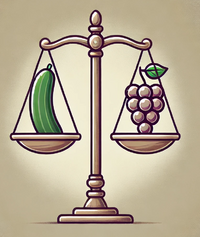Fairness
Humans are what sociologists call "prosocial." Although we are independent, self-oriented beings, we also care about the well-being of others. We live in, and rely on, social groups for our welfare. Daily life can be a delicate balance between our own wants and needs, and concern/empathy for others. Fairness is a driving principle. Fairness is the essence of the golden rule: "Do unto others as you would have them do unto you."
Fairness in primates.
Watch on YouTube
Perceptions of fairness are hugely important in keeping order in a prosocial society, so much so that evolution has "hard-wired" this into us. When we feel we are being treated fairly, humans will cooperate in a group, even sacrifice personal wellbeing. But perceptions of unfairness trigger anger. So, for example, on a lifeboat, we are willing to share the remaining food equally, even if it means we are still hungry. However, we would get upset if another person ate more than their fair share. This tendency to react strongly to perceived unfairness is not unique to humans—it’s seen in other social animals as well. A well-known experiment by primatologist Frans de Waal illustrates this powerfully. I am not a fan of studies using primates, but this one is so illustrative, I think it is worth making an exception. In this study, two monkeys are trained to do a task, and are rewarded with a cucumber slice for completing the task. Later, the second monkey begins getting rewarded with a grape (which has a higher value in monkey currency than the cucumber slice). The first monkey begins to notice this and becomes irate as the disparity continues. It is worth watching this YouTube excerpt from a TED Talk if you have the time.
Like a balance scale, fairness is determined by comparison, not an absolute standard. A balance scale doesn't measure absolute weight (e.g. how many pounds it weighs) it can only tell which weighs more than the other, or that they weigh the same. In de Waal's experiment, the first monkey was content UNTIL he saw another monkey getting a better reward. Likewise, humans also judge fairness relative to what others receive.
Perceptions of fairness will vary, depending on what different people are comparing it to. Ask two people which is heavier a cucumber or a bunch of grapes and you might get different answers based on what they are imagining as reference. If I am at dinner and we each get a slice of pepperoni pizza, that may seem like we are all being treated fairly. But a vegetarian lactose-intolerant tablemate would not likely feel the same way. There are many other measures of value other than weight.
This simple example illustrates the difficulty of judging fairness in the real world. Real world problems are complex. But our subconscious brains are wired to simplify complex problems, and to use our own beliefs/experiences as reference points. Since unfairness triggers anger and a fight response, it becomes even harder for people to agree on what is fair.
Double Standards
double standard - a set of principles that applies differently and usually more rigorously to one group of people or circumstances than to another - Merriam Webster
Double standards trigger anger because they feel inherently unfair. De Waal's monkey experiment is a clear example of this. But in real-world situations, identifying a double standard is far more complex—context and circumstances matter. Here's an example:
Person A steals a loaf of bread to feed a starving child.
Person B steals a loaf of bread from a starving child and sells to buy cigarettes.
A judge gives Person A a suspended sentence, Person B gets fined and is jailed. Was a double standard being applied? Like the balance scale, it depends on what you are putting on the other side of the scale, what weight you are giving to context.
Agreeing on double standards is surprisingly difficult. For example, friends of Person A may feel the judge was wise, but friends of person B might get angry at the perceived injustice. Each is using different criteria, which contributes to polarization.
Justification
When we perceive unfairness—especially against ourselves—our instinct is to defend and justify. In moments of threat, we naturally seek explanations that protect our position. When we are party to perceived unfairness, our instincts try to protect us by finding justification. And for most complex problems, we can usually find a perspective or hypothetical extenuating circumstances that can justify our actions.
People justify unfairness in several ways:
- Reframing - Convincing ourselves that what may look unfair is actually fair. (E.g. the second monkey in de Waal's experiment might believe he worked harder and thus deserved the extra reward.) We can always find a different measure of value after the fact to convince ourselves that the two sides of the scale are equal.
- "What Aboutism" - Instead of addressing an unfair act, focus is shifted to others who did the same and weren't punished. (They got away with it, so we should too.) Essentially this argues that two wrongs make a right.
- False-equivalence - Treating two different actions as if they were equally wrong. (Person A wasn't jailed for stealing bread, so I shouldn't be jailed for stealing a car.) In polarized situations, where there are only two options, this becomes common. We only know that one side of the scale is heavier than the other, we don't know (or care) how much heavier it is.
Snowball Effect
Unfairness fuels a cycle of retaliation. "They did it first" becomes an excuse to justify further unfairness. Ironically, a sense of fairness itself is used to defend unfair actions —escalating the conflict. Each side becomes angrier, convinced the other is to blame. Which only angers the other side more, as both justify their actions.


